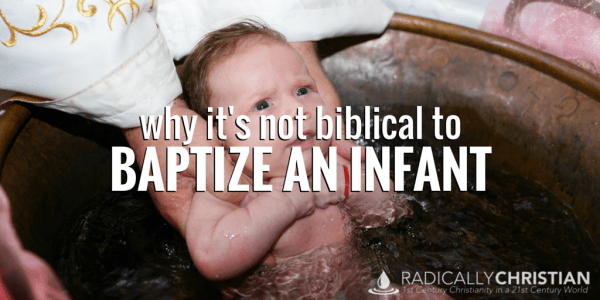Why It’s Not Biblical to Baptize an Infant
There are several denominations that practice “infant baptism.” While there are several reasons I can appreciate the motivation behind this practice, it certainly finds no justification in Scripture. It is simply not biblical to baptize an infant.

Briefly, here are a few reasons I can appreciate the motivation behind infant baptism:
I appreciate that parents care about their children’s souls.
I appreciate the fact that parents are promising to raise their children to love the Lord.
I appreciate the fact that these denominations recognize that water baptism is significant.
However, with those things being sincerely said, I must say that while infant baptism has been practiced for a very long time, it is not biblical. Consider these points:
1. Infant baptism is usually NOT even “baptism.”
It is actually a misnomer to call the practice, “infant baptism,” because the Greek word from which we get, “baptism” means “immersion.” Therefore, when a priest sprinkles water on an infant’s head, he hasn’t actually “baptized” the baby. Granted, it would seem rather cruel to immerse an infant in water – and there may indeed be some who do – but sprinkling water on a child’s head is not an immersion, so it is not a “baptism.”
2. An infant cannot believe.
As I said before, I appreciate the fact that these religious groups recognize there is a correlation between salvation and the water of baptism (see John 3:5 and 1 Peter 3:20-21), but water ALONE saves no one. Putting an unbelieving person in contact with water does absolutely nothing for that person. Jesus said, “Whoever believes and is baptized will be saved, but whoever does not believe will be condemned” (Mark 16:16). There is certainly a sense in which “baptism saves” (1 Peter 3:21), but only when accompanied with faith in Jesus Christ.
Biblically speaking, baptism should follow the personal confession, “I believe Jesus Christ is the son of God” (Acts 8:37; Romans 10:9-10). There is no reason to believe that parents – or anyone else – can make that confession on behalf of a child.
3. An infant has not inherited sin.
Time and space will not allow us to fully exhaust this point, but infant baptism is usually practiced because some people believe in the doctrine that children inherit sin from their parents. This doctrine is not taught in Scripture. In fact, Scripture teaches the opposite. Consider Ezekiel 18:20,
The soul who sins shall die. The son shall not suffer for the iniquity of the father, nor the father suffer for the iniquity of the son. The righteousness of the righteous shall be upon himself, and the wickedness of the wicked shall be upon himself.
God does not hold an infant responsible for the sins of his father or the sins of Adam. Sin is a matter of personal transgression and is not passed down from one generation to another.
UPDATE: See the more recent post that addresses those who practice infant baptism for reasons other than so-call inherited sin.
4. An infant cannot repent.
Baptism is all about repentance and forgiveness of sin. Baptism is an act of saying, “I am finished living in sin. I want to bury my life of sin and live like Jesus Christ. I want the forgiveness He offers through His blood” (see Romans 6:1-7). Baptism is an act of “appealing” to God for forgiveness, salvation, and a clean conscience (see 1 Peter 3:21; Acts 2:38; Acts 22:16).
An infant is incapable of making this appeal and since he has not inherited any sin, he has no sins from which to repent or seek forgiveness.
Is there any Scripture to support infant baptism?
The only passages of Scripture I’ve ever heard used to support the idea of infant baptism are the handful of passages in the book of Acts that speak of whole “households” being baptized (see Acts 10; 16:11-15; 16:25-34). Some argue that if whole households were baptized, then even their infants were baptized.
However, there are several problems with this line of reasoning.
Many households do not have any infants.
The idea of “household” can mean every adult in that family.
The households also “believed” (Acts 16:31) and “rejoiced” (Acts 16:34). Infants are incapable of doing either of those things.
So there is no reason to believe any infants were in these households, but even if there were infants present, they were not included in the group of people who were baptized.
Did you receive infant “baptism”?
If your parents had water sprinkled on you as a baby, you can certainly appreciate the fact that your parents cared about your soul and they knew water had something to do with salvation. However, now that you’re an adult, I would encourage you to continue studying this issue and – if you haven’t done so already – make the decision to, “Repent and be baptized…in the name of Jesus Christ for the forgiveness of your sins, and you will receive the gift of the Holy Spirit” (Acts 2:38).
It is only when YOU make the decision to clothe yourself with Christ (Galatians 3:26-27) that you will “wash away your sins” (Acts 22:16), be “united with Christ” (Romans 6:5), and be “saved” through His resurrection (1 Peter 3:21). I sincerely hope you will make that decision.
I love you and God loves you,

The post Why It’s Not Biblical to Baptize an Infant appeared first on Radically Christian.



Wes, i am a Christian evangelist in the UK and this was really good! Well done brother! Most won't accept this, because they are deceived and living in a lie. As Timothy says in 2 Timothy 3-4.
You baptize infants because that’s what the Early Christians did according to the Sacred Tradition passed down by the Apostles.